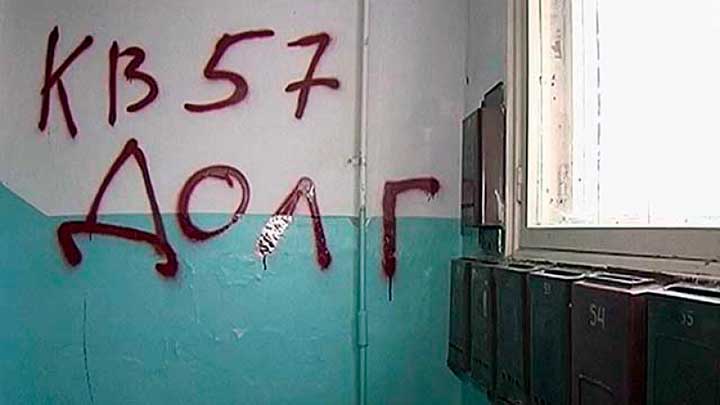The time has come when debtors have the opportunity to resist debt collectors at the legislative level. Thanks to Federal Law No. 230 (On the protection of the rights and legitimate interests of individuals when carrying out activities to repay overdue debts) adopted on June 21, 2016, now any citizen can complain about collection services if their rights are violated.
An effective method is to file a complaint against debt collectors to five authorities:
- FSSP.
- Roskomnadzor.
- NAPCA Association.
- Law enforcement agencies.
- Judicial system.
You can turn to Rospotrebnadzor for help, but only if bank employees violate consumer rights. If this is done by collection agencies (CA), the number will not work, since the debtors are not consumers of services and commodity-contractual relations.
According to Rosstat, over the past two years the number of people unable to cope with the financial burden has sharply increased. Moreover, these are not necessarily clients of credit institutions.
We are talking about debt obligations in all areas of the economy:
- loans;
- taxes/fines;
- Housing and communal services
- receipts.
Why did it happen? There are many reasons - Western sanctions with all the ensuing consequences, tightening of the tax system and complete control by the state, unemployment.
Most creditors (including government agencies) resort to a collection system and cannot do without serious monitoring. Therefore, deputies approved a law that controls collection, and also gave citizens the opportunity to punish collectors for the chaos that they have committed over the past ten years.
True, debtors still do not understand how to influence collection and continue to endure endless calls and visits from collectors.
According to the business Internet portal TAdviser, over the past 5 years the lending rate for Russians has been the highest. The total number of loans in 2020 increased by 12%, loans by 37%. At the same time, the number of debtors who do not repay the loan or are in arrears increased by 5.6%.
The average debt of a borrower, according to TAdviser, is 199 thousand rubles. Typically, to collect this amount, credit institutions resort to the help of collection agencies.
The bank either enters into an agency agreement for intermediary services, paying interest when repaying the debt, or sells a monetary obligation (assigns the right, Article 382 of the Civil Code). The consent of the defaulter is not required when making a transaction. He finds out about this from a written notice or demand for payment sent by the new creditor.
Many debtors experience negative feelings when receiving letters. Still would! It’s one thing to talk to a polite, albeit very persistent, bank employee, and another thing to talk to a debt collector. Dark stories about the methods of work of financial bouncers come to mind.
Schedule for raising funds by credit institutions (deposits, loans)
Regulation of collection activities - Federal Law No. 230
The Central Bank prohibits credit institutions from holding on their balance sheet an amount exceeding the limit of loans from third-party lenders. Banks borrow funds at a small interest rate and resell them to the end consumer (borrowers). Any unpaid debt under a loan agreement reduces the amount that the bank can re-borrow. It turns out that contracts need to be written off in order to get new money and sell to clients.
You can write it off in two ways:
- Take the debtor to court and transfer the case to the bailiffs. The proceeds from the sale of the seized property will go to the balance sheet of the bank, which will put it back into circulation.
- Sell the debt to collectors, thereby getting rid of the contract. Debts are sold in portfolios for a small percentage, freeing up space for new loans.
It turns out that collectors are an integral part of the economy. Without them, lending becomes impossible in principle. Do the contracts have to go somewhere? Litigation over state fees is unprofitable and leads to large expenses. There are many debts not exceeding 500-1000 rubles, and the duty makes litigation pointless.
How does Federal Law No. 230 protect debtors?
It is no secret that collectors conduct business with an eye on the 90s and people working in the system are stuck there for a long time.
But everything has changed, now it won’t be possible to work this way (by intimidating and threatening). Agencies, banks and employees bear not only civil, but also criminal liability for their actions.
For example, the law clearly states fines for violations of its provisions. Collection actions will be controlled by Art. 14.57 Code of Administrative Offenses of the Russian Federation:
- Organizations not included in the register - 200 thousand.
- Spacecraft registered in the register - from 50 to 500 thousand.
- Illegal activities of a CA - 2 million rubles + 1 million is imposed on the manager.
Also, responsible persons who committed unlawful actions by agencies may be disqualified from office for a year, and the activities of organizations suspended for 90 days.
Important! Agencies that are not registered, as well as persons engaged in illegal collection, are advised to refrain from communicating with debtors. This will be cheaper than paying 200-500 thousand for each complaint.
Debtors and borrowers are required to know and understand their rights. As soon as judicial practice on punishing CAs is normalized, organizations will solve problems in the legal field.
Main provisions of the law:
- calls no more than twice a week;
- meetings with the debtor no more than once a week;
- the debtor has the right to revoke consent to transfer the debt to third parties;
- the collector has no right to exert mental and physical pressure;
- The collector must not have a criminal record.
What laws govern debt collection?
Expert opinion
Alice
Lawyer, Moscow
Ask a lawyer
All collection activities are focused on collecting problem debt. Creditors resort to them only when the debt is too large in amount and the payer has refused to pay for more than one year. Confiscation of property or collection of funds is carried out in a pre-trial manner. The basis for their actions is a bilateral agreement concluded by the creditor with the collection company. It is called an “assignment agreement” (or in other words, an agency agreement).
Two standard schemes work here:
- Debts are fully repaid.
- Debts are collected and returned to the lender for a certain fee.
In order to properly file a complaint against debt collectors, it is very important to know on what basis this can be done. The following legislative norms are currently in force.
| Link to law | What exactly regulates |
| Code of Civil Procedure of the Russian Federation | The civil litigation process. |
| Act No. 229-FZ of October 2, 2007 | Mechanisms and schemes of work of state executive services. |
| Act No. 230-FZ of January 1, 2020 | Introducing significant restrictions on the actions of collection organizations. |
| Article 14.57 Code of Administrative Offenses of the Russian Federation | Punishment for illegal collection of overdue debt. |
| Article 13.11 Code of Administrative Offenses of the Russian Federation | Responsibility measures for illegal methods in relation to the handling of personal data of individuals and legal entities. |
| Article 20.1 of the Code of Administrative Offenses of the Russian Federation | Punishment for hooligan behavior in public places and personally towards citizens. |
| Article 5.61 Code of Administrative Offenses of the Russian Federation | Being punished for insults. |
| Article 163 of the Criminal Code of the Russian Federation | Describes the penalties for a debt collector after a complaint against the actions of debt collectors has been considered in court and proven. This is called extortion. |
| Article 119 of the Criminal Code of the Republic of Belarus | Penalties for threats to cause harm to life. |
Restrictive conditions for the existence of a collection service, after which they have the right to exist and conduct their work:
- Assets should not be less than 10 million rubles.
- Availability of permanent insurance in the amount of 10 million rubles.
- Registration in the Unified State Register of Legal Entities (or Unified State Register of Legal Entities, depending on the form of ownership).
- Always up-to-date and functioning official website.
Previously, until 2020, collection services in Moscow and other Russian cities pursued a strict policy towards debtors. Their methods were aggressive and brutal actions, condemned by the Criminal Code of the Russian Federation. They constantly referred to Article 382 of the Civil Code of the Russian Federation, which states that it is permissible to transfer other people's debts to intermediary services (a third party) without obtaining the written or oral consent of the debtor. But after the entry into force of the new legal provision No. 230-FZ dated January 1, 2017.
Illegal activities of collection agencies
Penalties for “black” collectors are much higher. Individuals for illegal collection activities face a penalty of 50 to 500 thousand rubles. Legal individuals will have to pay from 200 thousand to 2 million rubles, and the manager from 100 thousand to 1 million (Article 14.57, paragraph 4 of the Administrative Code).
In addition, the claimant can be brought to criminal liability for extortion (Article 163 of the Criminal Code). If the debtor has received threats of physical assault. 119 of the Criminal Code, a “black” collector faces imprisonment or forced labor.
Results from filing a complaint with Rospotrebnadzor
Considering the specifics of the supervisory powers of Rospotrebnadzor, not all unlawful actions of debt collectors can be appealed to this body. It should be remembered that the scope of activity of this body, defined in the Regulations approved by Decree of the Government of the Russian Federation No. 428, is supervision of compliance with consumer rights.
Banks partially fall into this category of violators and are subject to the law “On the Protection of Consumer Rights.” Different rules of law apply to them. However, this does not deprive debtors of the right to appeal against unlawful actions of banks and collectors regarding the disclosure of personal data.
If such a violation is established, the perpetrator may face liability:
- disciplinary;
- civil law;
- administrative;
- criminal
All types of liability, sanctions and fines are contained in the summary table at the link provided.
Who are collectors
Collection agencies are commercial organizations engaged in collecting overdue debts, acting as an intermediary between the borrower and the lender.
Today there are a large number of companies in the country engaged in similar activities. But not everyone can contact debtors. According to the law, only CAs listed in the State Register have the right to work with a defaulter. The list is publicly available on the official website of the FSSP.
Collectors are required to perform work in accordance with current legislation. Exceeding authority entails administrative or criminal penalties.
In the collection services market, not all firms play by the rules established by law. And now we come across so-called black tax collectors.
They work unofficially and use methods that grossly violate the law:
- threaten the life and health of the debtor;
- damage property;
- they tarnish their reputation.
Thanks to such actions, the population has developed a negative attitude towards professional debt collectors.
How to write a complaint?
The powers of the prosecutor's office are broader than those of the police; the work of this institution is aimed not only at investigating crimes that have already been committed, but also at preventing those that may be committed.
In a word, the prosecutor's office is responsible for verifying compliance with the legality of actions and preventing crime. A complaint to the prosecutor's office, as a rule, pacifies debt collectors who do not comply with the law. Its writing proceeds according to the following algorithm :
- The complaint is written in free form;
- Transferred to the prosecutor's office;
- The complaint must be accompanied by a response to the requests that you previously submitted to the bank or collection agency. If no official response has been received from these organizations, you must attach a certified copy of the application or a receipt for sending a registered letter;
- The complaint must be drawn up in several copies, one kept with you, one sent to a debt collection agency, one directly to the prosecutor’s office;
- If possible, it is necessary to support the complaint with material evidence: a recording of a telephone conversation, a printout of calls from the operator, photographs, in general, anything that can prove your accusations;
- After considering the complaint, the prosecutor's office must initiate an investigation, which threatens the agency with serious fines if violations of the law are confirmed.
As a rule, after the collection agency receives a copy of the complaint, the collectors begin to behave more correctly.
The process of transfer to the prosecutor can be carried out in several ways at your personal choice:
- To the prosecutor's office;
- To the prosecutor, during a personal reception;
- Through the box for citizens' appeals;
- By mail, registered mail.
What is allowed to collectors
Indeed, until recently, collectors, while performing work, misled the borrower, threatening criminal punishment (Article 177 of the Criminal Code), and exerting pressure. But since January 2020, such methods are prohibited by law.
Limited communication
Art. 7 Federal Law-230 regulates the time and frequency of telephone calls and personal meetings. The agency representative has the right to disturb the debtor with calls no more than twice a day and only twice a week.
Time from 08.00 - 22.00, on holidays from 09.00 - 20.00. The collector is required to make audio recordings of conversations with the debtor.
The collection officer has the right to meet with the defaulter only once a week. And 4 months after demands for debt payment arise, the debtor may completely refuse personal communication (Article 8, Clause 6 of the Federal Law).
Responsibilities of the claimant:
- introduce yourself, give your full name;
- name the organization he represents;
- declare the amount of debt;
- leave contact information;
- indicate your current account.
Communication with third parties with the consent of the borrower
According to Art. 4 clause 5 of Federal Law-230, the collector has no right to interact with relatives, colleagues, neighbors of the debtor, call and ask questions. To do this, you must obtain the consent of the interlocutor and written permission from the borrower (which can be revoked at any time).
Letters
An agency employee has the right to send letters to the debtor. The contents of the message are clearly regulated by Art. 7 clause 7 FZ-230:
- debt information;
- information about the documents on the basis of which the claimant makes demands;
- details of the account to which the money should be sent;
- contact details of the organization.
What actions of debt collectors are considered illegal?

A claim can be submitted to government authorities only in the event of the following abuses of the powers of collection services:
- Calls at night - from 22:00 to 06:00.
- Insults, humiliation of personal dignity.
- Lack of identity confirmation, any information about the representative of the debt collection service.
- Disrespectful address to a debtor (for example, rude address to “you”).
- Disclosure of confidential information about a bank client - the amount of the amount, within what time payments must be repaid, residential address, telephone number, etc.
- Financial fraud. The representative of the collection service is already receiving debt amounts from the bank borrower, while under the terms of the agreement he is obliged to pay only to the bank and not to third parties.
- Extortion. Gives the right to complain to the relevant authorities - the police, the prosecutor's office.
- Blackmail with or without threats of murder.
- Request from the debtor's employer to pay amounts owed.
- Intimidation of relatives, relatives, friends of the defaulter.
- Sending SMS messages and threatening letters several times a day.
- Personal meeting at the borrower’s residence more than once a week.
- Psychological pressure is constant.
- Causing damage to the debtor's property.
In order to feel confident in the position of a defaulter who is threatened by debt collectors, to understand how to write a complaint against debt collectors, you need to enlist the support of a lawyer or attorney throughout the entire resolution of the issue.
Expert opinion
Alice
Lawyer, Moscow
Ask a lawyer
It is possible by law to completely ignore attacks from claimants after 4 months have passed from the date of the first announcement that the debts have been transferred to a third party, who will now have the right to collect. Or from the date of the first overdue payment to the main creditor.
Which companies are included in the FSSP register
In order for an agency to be included in the register, it must comply with the requirements of Art. 13 FZ-230:
- the constituent documents of the main OKVED of the company indicate - collection of overdue debt;
- authorized capital from 10 million rubles;
- It is mandatory to have annual insurance in the amount of 10 million rubles (a guarantee of compensation for possible damage to the debtor);
- An organization must have licensed software and a website.

How to protect yourself from debt collectors
You can protect yourself from psychological or physical pressure by filing a complaint with law enforcement agencies. It is advisable to make an audio or video recording of the communication as evidence of illegal actions, and obtain testimony from witnesses.
Police officers will take the necessary measures and bring the offender to justice.
Important! The time of “black” collectors is running out. The state is developing a law prohibiting credit institutions from dealing with companies not included in the State Register.
Making a decision
Article 126 of Federal Law No. 229 reflects the time frame for consideration of a complaint.
They are 10 days from the date of its transfer.
After consideration, a decision is made:
- completely or partially cancel the decision that was being challenged;
- cancel the act and oblige the official to adopt a new one;
- recognize the complained act or inaction as unlawful, demand that it be stopped and the consequences eliminated.
If the complaint is satisfied by the court or the prosecutor's office, the bailiff is held accountable within the framework of the Arbitration Procedure Code of the Russian Federation or another legal act. The applicant may also be compensated for expenses and moral damages.
A complaint to the FSSP can be filed against unlawful actions of a bailiff, a credit institution, or debt collectors. The document is drawn up in writing and delivered in person. Application via the Internet is allowed. If the complaint is accepted, the offender will be held accountable.
Where to complain about debt collectors
Complaint to the FSSP
Complaints against debt collectors to the FSSP are now a priority. The fact is that bailiffs were made the supervisory body for working with collection agencies.
First, it is checked whether the agency is on the register. This can be done on the FSSP website. If the legal organization is registered, then a complaint is filed to verify its activities.
How to file a complaint:
- Evidence of offenses is collected, for example, call printouts from which it is clear that agency phones called more than twice.
- Call the bailiff hotline at the numbers listed on the website.
- Select the region where the agency is registered and contact the local FSSP office.
- The bailiffs website allows citizens to file complaints electronically. To do this, you need to go to the “Appeals” section.
Important! Citizens' claims are registered within three days, and verification actions are carried out within 30 calendar days.
The problem is described in any form and the necessary documents are attached.
Complaint to Roskomnadzor
We complain about collectors for calling Roskomnadzor. It is necessary to understand that this body does not consider the dialogue with penalties, but checks the fact and number of calls. For example, if they call a hundred times a day, you can stop this by writing a complaint electronically.
You can also restrict the subscriber to incoming calls and take a printout.
Important! It is necessary to use such an appeal only to demonstrate intentions. At the moment it is of little use, but in the future any confirmation of violations may be beneficial. For example, during a trial.
Complaint to NAPCA
You can file a complaint on the official NAPCA website. If the agency is on their registry, don't be shy about flooding the association with emails.
Most likely, such an appeal will be of a preventive nature for further actions. But we still recommend writing such an appeal.
Application to the prosecutor's office or police
A statement to the prosecutor's office or the police is written in case of physical and psychological pressure from collectors. The sample will be provided at any branch or electronically on the UK website.
Law enforcement agencies are required to look for evidence of agency guilt on their own, but if you attach a recording of the negotiations, this will significantly speed up the process.
Important! KA will reject any attempts to prove guilt in violating the law and shift the blame to employees. We advise you to write a statement not about the specific person who made the threat, but about the agency as a whole and its management.
Lawsuit
Any citizen or legal entity has the right to go to court in case of violation of their rights and interests (Article 3 of the Code of Civil Procedure of the Russian Federation).
Violation of Federal Law 230 is a direct violation of rights, which serves as a basis for a claim. We advise you to find a qualified lawyer to defend your interests.
Important! In any subject of the Russian Federation there are colleges of lawyers that are obliged to provide a lawyer absolutely free of charge.
You can also always consult on our website by asking a question in the comments or by contacting the specialist on duty in the form of a pop-up window.
Complain to the Central Bank
So, you have decided to deal with the violators of your peace on your own, without turning to experienced lawyers for representation. You can try to write a complaint against the bank to the Central Bank. Here you can only get protection from unlawful actions of bank employees. Threats, insults and similar actions on the part of lenders are a problem for the prosecutor’s office and Rospotrebnadzor. This means that in your application you must describe only those actions of the bank that violate the laws governing its work.
There are two main options for violating your rights. The bank sold the debt into the hands of collectors, but its right was not properly stated in the agreement. Either the actions of the bank or collectors violate the law on non-disclosure of personal data.
For example, debt collectors came to your work and voiced their demands (and not always legitimate ones) in front of your colleagues. Or they conveyed the demand for repayment of the debt through their neighbors. Or they called on the phone, and one of the relatives or even strangers answered the phone, and announced the amount of debt. These calls are illegal. At the same time, the norms of legislation on the activities of banks, and to be more precise, on bank secrecy are violated.
If you want to write a complaint specifically about this, then you really need to contact the Central Bank. The actions of the Central Bank in this case may be ambiguous. The maximum that can be achieved is an order from the Central Bank to the violators to correct themselves as soon as possible. The minimum is complete ignorance of your application or meaningless replies. And there is no guarantee that the calls will stop. The only thing you will most likely achieve is a reduction in aggression on the part of the creditor and collectors, since understanding your legal literacy will slightly reduce their ardor.
Bottom line
Federal Law 230 gave debtors the opportunity to complain against debt collectors, knowing that the law would help. Of course, such a system is still poorly debugged, but within a year it should show its effectiveness.
Try to complain comprehensively: NAPKA, the prosecutor's office, bailiffs, courts, Roskomnadzor, etc. The more complaints you receive, the higher the chances of pressing the collectors.
- Today, debt collectors are not financial bouncers who use harsh methods of psychological or physical influence. Their activities are carried out strictly within the framework of the law (Federal Law 230).
- Violation of the Code is punishable by large fines or suspension of activities. If the organization is repeatedly held accountable, it is excluded from the register.
- Only organizations included in the State Register of the FSSP can demand repayment of overdue debts.
- Organizations not listed in the register are deprived of the right to demand payment of debt. As a rule, they use illegal methods of influence in their work. In this case, the debtor should contact law enforcement agencies.
- You shouldn't be afraid of dialogue. The debtor will be able to defend his rights if they are violated by the collection.
Debtor's appeal to the police
A complaint about illegal actions of debt collectors can be submitted to any territorial police department. However, lawyers advise passing it on:
- or at the place of residence of the victim;
- or at the place where the illegal act was committed by representatives of the collection agency;
- or at the location of the claimant.
As already noted, the police (formerly the police) should be disturbed if the borrower sees signs of a crime or offense in the collector’s actions. In this case, it must contain a detailed description of the incident:
- what happened;
- where and when;
- which collection agency violated the rights of a citizen;
- with whom of his representatives did he contact, under what circumstances, etc.
Any sample police statement, in addition to the descriptive part, contains a number of mandatory details:
- addressee of the complaint: full name and position (head of the police department, district police officer, duty investigator, etc.);
- police unit number and area;
- from whom the application was received: full name and place of residence of the debtor who suffered from the actions of debt collectors, contact details;
- after describing the unlawful behavior of the collectors, it is necessary to indicate which articles of the Criminal Code and the Code of Administrative Offenses were violated by them;
- a requirement to suppress the illegal acts of collectors and to initiate criminal proceedings against these persons;
- list of attached documentary evidence;
- date of filing the complaint and signature of the debtor.
In addition to the evidence collected by the applicant, a photocopy of his passport is attached to the application. Within a 10-day period, law enforcement officers must either initiate a criminal case at the request of a citizen, or refuse to do so with reason. It is advisable to send a copy of the filed complaint to the collection agency.










